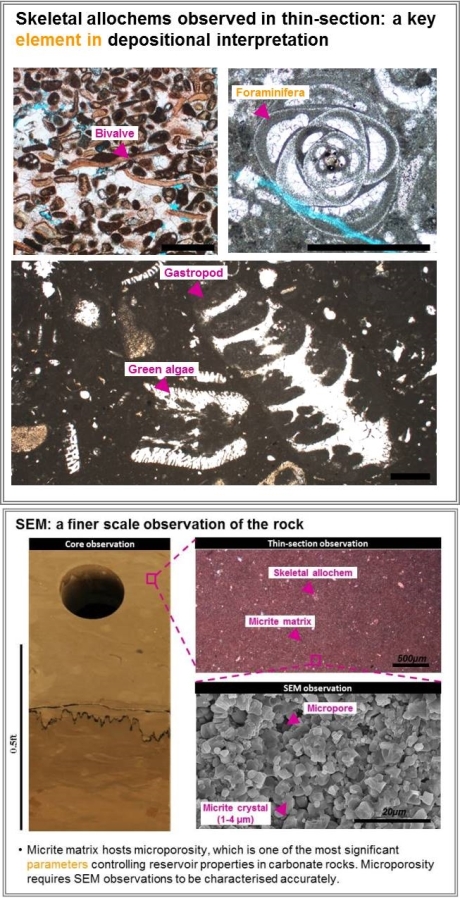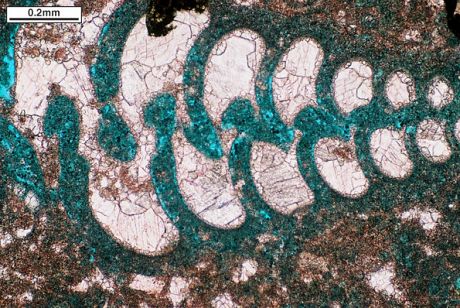
Course summary and outline
This course is focused on the analysis of depositional textures and their subsequent diagenetic modifications as the main control on the pore system heterogeneity and complexity. The intricate inter-relationship of the depositional and burial history can be unravelled to allow prediction of reservoir facies and reconstruction of three-dimensional reservoir models. Carbonate rock typing provides a tool for propagating reservoir properties in the static/geological models based on an exhaustive calibration of conventional and computed logs with rock data at core, plug, thin-section and pore scales. The course demonstrates the value of understanding pore system evolution as a part of large-scale volumetric assessments and development of carbonate reservoirs.
The workshop is organised into three sessions:
Part A: Reservoir quality analysis - what it is and how to approach it
• Definition of reservoir quality
• Introduction to carbonate rock pore systems: a heterogeneous and complex world
• Commonly used analytical techniques to measure pore volume and connectivity
• Definition of reservoir quality
• Introduction to carbonate rock pore systems: a heterogeneous and complex world
• Commonly used analytical techniques to measure pore volume and connectivity
Part B: Controls on reservoir quality - from deposition to diagenesis
• Depositional controls
- Texture: allochems vs matrix
- Skeletal and non-skeletal allochems: how they affect pore volume and distribution
- Micritic matrix: a small world with a big impact
- Bioturbation
- Clay content
• Diagenetic controls
- Dissolution: early vs late
- Cementation: pore-lining vs pore-filling
- Dolomitisation: replacive vs cementing
- Compaction
• Tectonic controls
- Fracturing
• Depositional controls
- Texture: allochems vs matrix
- Skeletal and non-skeletal allochems: how they affect pore volume and distribution
- Micritic matrix: a small world with a big impact
- Bioturbation
- Clay content
• Diagenetic controls
- Dissolution: early vs late
- Cementation: pore-lining vs pore-filling
- Dolomitisation: replacive vs cementing
- Compaction
• Tectonic controls
- Fracturing
Part C: Rock types and their importance on the large-scale modelling
• How to display porosity/permeability data
• How to define rock types
• Importance of rock typing in reservoir modelling
• How to display porosity/permeability data
• How to define rock types
• Importance of rock typing in reservoir modelling
Note: each section will be accompanied by examples from case studies.

Course Information
Who Should Attend?
The course is targeted at petroleum geologists, geoscientists, petrophysicists and engineers involved in exploration and production of carbonate plays. Previous knowledge in carbonate sedimentology is not necessarily required.
The course is targeted at petroleum geologists, geoscientists, petrophysicists and engineers involved in exploration and production of carbonate plays. Previous knowledge in carbonate sedimentology is not necessarily required.
If you would like more information on this, or any other courses, please e-mail training@badley-ashton.co.uk or call +44 (0) 1507 588353.

Case Studies
The following case studies may be of interest:- Sedimentology and depositional setting of the Asl and Hawara Members, October Field, Egypt
- High-frequency cyclicity in the Late Jurassic Arab Formation in a giant gas field, United Arab Emirates?
- New Insight on the Depositional Environment and Facies Atlas of Aptian in a Super Giant Carbonate Field in the Middle East

Articles
The following articles may be of interest:

Publications
The following publications may be of interest:
- Link Between Microporous Limestones and Elastic Properties in Tight Carbonates. A Case Study from the Lower Arab Formation Upper Jurassic, Onshore United Arab Emirates
- Origin of Complex Carbonate Pore Systems and Associated Reservoir Quality Variations: an Example From the Arab Formation Upper Jurassic, Onshore United Arab Emirates
- Controls on Reservoir Quality and Reservoir Architecture of Early Cretaceous carbonates in an Abu Dhabi Onshore Field Lekhwair, Kharaib and Lower Shuaiba Formations
- Field-Scale Reservoir Quality Variations and Predictability in Uncored Intervals within the Arab Formation, offshore Abu Dhabi (United Arab Emirates)
- Reservoir Characterisation of the Arab Formation (Upper Jurassic), offshore Abu Dhabi (United Arab Emirates)

